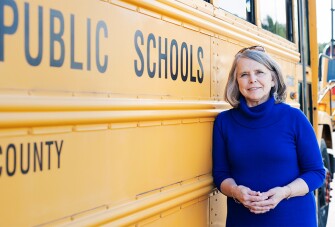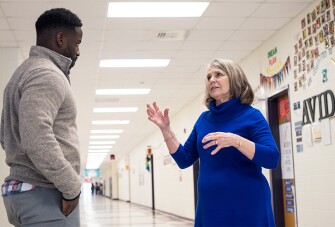For Johnnye Waller, one guiding principle undergirds her approach to serving the homeless students in Lee County Schools in North Carolina: The only difference, she says, between her family and theirs is luck.
“I always try to think ... for the grace of God, I could be sitting in the same situation,” she said. “I try to remember that.”
But for the families Waller works with, nothing is left to chance. An enrichment program she created gives this most vulnerable of populations a critical academic boost over the summer, and that program is earning widespread recognition in the state.
EdWeek’s Leadership Symposium
Waller, 67, wears a lot of hats in Lee County Schools. As the director of student services, she oversees the district’s guidance counselors, nurses, and social workers. She is also in charge of nutrition, transportation, and discipline as the assistant superintendent of auxiliary services. But it’s as Lee County Schools’ homeless education liaison, that Waller has made a special commitment to providing for the district’s transient population—a group of students that faces a host of special challenges.
- Be empathetic: When people come to us, they come with all they have, which may include anger, hostility, and other negative emotions stemming from traumatic experiences in their past. We must stop and ask ourselves, “What would I have done if I had been in their shoes?”
- Make decisions in the children’s best interest: Our decisions must be made on what will enable the individual student to learn the most and will be in his best interest. Our every action must be student centered with decisions which help the student achieve success—not only academically but socially and emotionally, especially for our most vulnerable populations.
- Make a difference: Start with one student at a time and meet them where they are. We may not see the immediate impact of our touch, but it begins to foster corrections and relationships which are essential to human growth and success.
Basics such as clothing, food, shelter, and school supplies are not a given. And these students are often coping with whatever precipitated their families’ homelessness, which could be a job loss, a death or illness in the family, a natural disaster, or drug addiction. Such students struggle to keep up academically. They miss more school days. They are at higher risk for dropping out. They may also be living without a parent or guardian.
Homelessness among school-aged children is an issue in every corner of the country, and their numbers—around 1.4 million nationally—are growing. In Lee County, a series of hurricanes and the opioid crisis have contributed to a rise in the area’s homeless population in recent years.

So far this year, Lee County Schools has identified about 350 of its 10,000 students who don’t have a fixed living situation, although that’s likely an undercount.
Students, especially older ones, often don’t tell school staff when they’ve lost their home. They fear it could get their parents in trouble, get them sent back to a bad home situation, or land them in foster care.
There’s also the social stigma. And students may not even realize they count as homeless.
Educating teachers and other staff, such as school counselors and nurses, to watch out for important signs, such as sleeping in class, homework not getting turned in, or a sudden change in behavior, helps catch those kids who can so easily be overlooked.
But not on Waller’s watch.

During the school year, Waller and her team keep close tabs on the academic progress of students they’ve identified as homeless. A member of Waller’s team meets quarterly with each student to go over their grades, attendance, and any behavior-related incidents. It’s a time to discuss issues going on in a student’s personal life that may be affecting their schoolwork, and praise them if they’ve made academic improvements. Waller’s team is also ready to jump in to help when they see students struggling.
That may mean talking to a student’s teacher, buying school supplies, providing health screenings, or connecting the student with a tutor.
Equally important, Waller believes, is ensuring that all these different parts, the central office, school principals, teachers, and support staff, understand when a student is facing extra difficulties in their personal life and are in constant communication with one another. Otherwise, it is all too easy for homeless students to get lost in the district bureaucracy.
“As school administrators, we have learned that we can only try to control what we can control, and that’s where I think Dr. Waller excels,” said Andy Bryan, the district’s superintendent. That could be anything from collecting winter coats for students or sending a teacher to tutor students who are staying at a local shelter.
“She truly gets what many of our families often struggle with outside of the school setting,” he said. “Whether it’s being homeless, or living in poverty, or just struggling to make ends meet.”
As many as 70 percent of the students in the district come from low-income families.
What stands out about Waller, her colleagues say, is her deep sense of empathy, something she said comes from her late father and was honed by her time as a social worker. Her father owned the service station at the juncture of two highways in the rural North Carolina community Waller grew up in. Waller said her father, who died when she was 15, was always looking out for his neighbors in small ways. He would give away snacks to children and heating oil and gas to people in need.

Waller’s approach to serving homeless students mirrors that: she’s equally attuned to their small but critical needs as she is to the large ones.
When Waller reflects on her time working for child protective services for the state, she thinks nothing could have prepared her better for her current role as a district administrator.
“I learned a lot of valuable life lessons in that position. I have been in homes where you see chickens walking on the floor. There is no heat,” she said. “Without that lens, would I see the trauma the child has been through? … I think that’s a valuable piece: to look a little further than, ‘they didn’t bring their homework in today.’ ”
The initiative that Waller sees as having the most impact for the homeless students in Lee County Schools is Project Lift-Off, a summer enrichment program for middle school students who are experiencing homelessness. It serves around 30 students a year. Students in high school who have aged out of the program get to come back as mentors to the younger students.
The program has an academic base—students work on reading and math with Lee County teachers. But it’s not all business.
Students go on field trips. They visit local businesses and colleges. They also participate in community projects, such as making care packages for leukemia patients. And every year Project Lift-Off staff take students to pick out two pairs of shoes each at a local shoe store with money donated by the community.
The main goals are to help students catch up academically and provide them with a positive place to be when school is out. But there are other benefits, said Waller.
“We see that when students first come in to the program they are quiet and sit back for a few days,” she said. “But at the end of Project Lift-Off it is amazing to see their confidence.”
The North Carolina School Boards Association gave Project Lift-Off an award in 2018 recognizing it as an exemplary education program for boosting student achievement. That same year the state’s department of education recognized Waller as the North Carolina homeless liaison of the year. Waller has presented on Project Lift-Off at state and national conferences, and school districts across North Carolina have copied and adapted the idea for themselves.
Waller pools resources from several areas to pay for the program, including federal money for homeless students and donations from the community.
Project Lift-Off students and their parents are also asked to sign something called “the promise” to keep their grades and attendance up during the school year, which Waller and her staff continually evaluate through their quarterly meetings. While Waller said the most tangible impact of the program is more qualitative and different for individual students, it has translated into better attendance and improved grades for many.
If we take care of their social-emotional needs, the academic piece will come.
Now entering its 10th year, Project Lift-Off is a fixture in Lee County Schools and “a model program for the state,” said Lisa Philips, the state coordinator for homeless children for the North Carolina department of education.
And, Phillips said, Waller is a model administrator and homeless liaison.
“She is smart. She is savvy. She is highly intelligent, caring. Throw any adjective out there, she encompasses all of them,” said Phillips. “I have never met anyone like her. She is always learning … She is open to learning and finding new and innovative ways to support children and youth.”
Another significant part of Waller’s job—and where others who work with her say she excels—is educating the staff and community around her about homelessness. It’s also among the most challenging aspects of her job. For one, there are a lot of misconceptions about the definition of homelessness. People often think it means children living on the street, but it can be any student who doesn’t have a fixed place to live. So that could be a family staying in a shelter or with relatives.
Righting those misconceptions is crucial because it helps staff identify homeless students and get them the support they desperately need, said Waller.
Equally important is helping educators understand all the hurdles—big and small—that students face when they don’t have a permanent home. This may mean talking to a teacher about making sure a student has time and space to complete an assignment—such as an art project—at school, said Waller, something that may be impossible if a student is living out of a car.
“My job is to increase awareness that poverty and homelessness is traumatic, and it’s going to impact them academically,” said Waller. “And if we take care of their social-emotional needs, the academic piece will come.”







